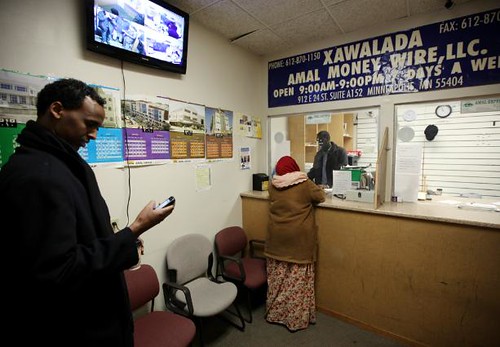
Somalian-Americans line up to transfer money to their families still living inside the Horn of Africa nation. The US government has targeted Somalians for harrassment., a photo by Pan-African News Wire File Photos on Flickr.
British bank faces backlash for cutting money transfer service to Somalia
Barclays bank says it doesn't want to enable money laundering, but critics say it is cutting vital flows of money into the country.
By Tom Murphy, Guest blogger / August 13, 2013
The Christian Science Monitor
Weekly Digital Edition
Somalis are bracing for the impact of the British bank Barclay’s decision to sever ties with most money transfer companies in Somalia. About 250 remittance agencies lost their partnership with Barclays on Monday.
The banking giant says it is concerned that it does not know where money transfers are going and who is sending the money. With little ability to track cash flows, the company says it is much easier for money launderers and the financing of terrorist activities.
“It is recognized that some money service businesses don’t have the proper checks in place to spot criminal activity and could unwittingly be facilitating money laundering and terrorist financing,” said Barclays spokesperson Daniel Hunger to the UN humanitarian news agency IRIN.
Somalis living in and out of Somalia say that the plan will cut vital flows of money.
More money is sent to people in Somalia through remittances ($1.2 billion) than is provided in international aid (~$800 million). The sum of remittances accounts for roughly half of Somalia’s gross national income (GNI). Money set by family members living abroad helps to support the education of siblings or a parent’s business. Various vendors have proliferated across Somalia as a result of the amount of money flowing both in and out of the country through person to person transfers.
It is not only people who benefit. NGOs and civil society organizations use cash transfer services to process cash disbursements and budgetary funds. For instance, British-Somali Olympic gold medal winner Mo Farah issued a call for Barclays to reverse its decision, citing the impact it will have on Somalis and charities like his charity.
“The Mo Farah Foundation, along with some of the world’s biggest charities and organizations, including the UN, relies on these businesses to channel funds and pay local staff,” he said in late July. “This decision could mean life or death to millions of Somalis.”
Somali President Hassan Sheikh Mohamud pleaded with Barclays in June not to go though with the decision. He expressed concerns that the progress made by Somalia over the past few years may be set back.
“Somalia is on the brink of a breakthrough after two decades of chaos. We have the support of Britain and the world and we need the support of all our friends across all sectors. Barclays are a friend and we cannot understand their sudden decision to foreclose on legitimate accounts that support money transfer,” said Mr. Mohamud.
British politicians also urged Barclays to consider delaying the implementation of its new policy. Forty-Seven Labour ministers of parliament sent a letter to Barclays and the government to consider waiting six months.
They recognize that the decision by the United States to fine the bank HSBC $1.9 billion for its weak money laundering checks has an impact on Barclays. They say that the reaction is too harsh and will also damage the British businesses that participate in the sending and receiving of money with Somalia.
Electronic money transfers are the most efficient way to send money home, writes Somali Nadifa Mohamed in the Guardian. She says her father used to have to deliver the money he made by hand to his family in Somaliland. Now Ms. Mohamed can send money almost instantly to her family who are still do not have easy access to paved roads.
Her family is not alone – an estimated 40 percent of people in the region are reliant on remittances. She says it may be a conservative guess, nevertheless it means major cuts will have an immediate impact on regional families. And there are the 80 percent of Somali businesses that use remittances for starting up funds, said Mohamed Ali, who runs the Somali NGO Iftiin Foundation, to Al Jazeera.
Electronic cash transfers are a major technological jump in Africa. Kenya’s MPESA, a service run by phone company Safaricom, allows people to send money from one cell phone to another. It can be used to make a purchase at a street-side business
Many recognize that Barclays is concerned about funding terrorist networks in Somalia. They say that should not scare the bank away, as it has for other major transfer providers. Rather, leaders should look for regulatory solutions, Mr. Ali writes.
The regulatory burden for monitoring Hawalas (the traditional money transfer system) should be placed on the government and not banks, with clear guidelines that limit bank obligations and government officials in charge of due diligence and risk evaluation of remittance agencies. Banks, regulators and Hawala operators also need to work together to develop due diligence and monitoring strategies that work within the Hawala framework, which has its own system of checks.
185 Somali civil society groups add to the list of advocates for a change to Barclays’ pending policy change. The UK government has responded to the growing chorus by saying that it is a private decision by the bank. The changes are still on course to be enacted.
No comments:
Post a Comment